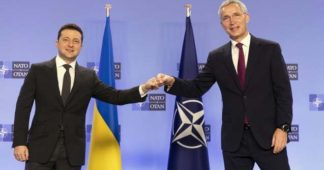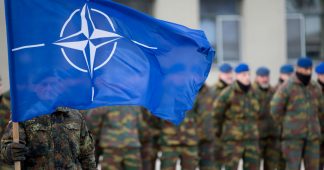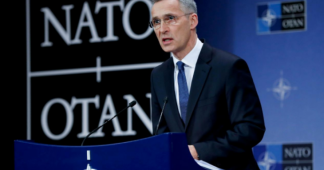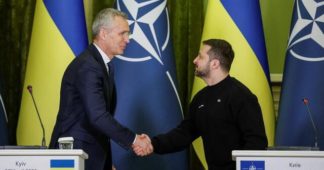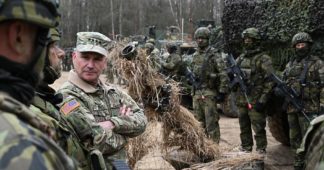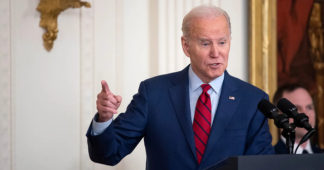NATO to announce creation of Ukraine “command” at Washington summit
By Andre Damon
Jul.6, 2024
The US-led NATO military alliance will establish a separate command dedicated to the war against Russia in Ukraine at next week’s summit in Washington, D.C., NATO Secretary-General Jens Stoltenberg said Friday.
Stoltenberg announced that “NATO will take over the coordination and provision of most international security assistance” to Ukraine under “a command led by a three-star general, and around 700 personnel working at a NATO headquarters in Germany.”
In addition to the measures announced by Stoltenberg Friday, US press reports have indicated that NATO will station a high-ranking civilian official inside Ukraine itself and may officially launch what is being called internally “NATO Mission Ukraine.”
The moves—both announced and as yet unannounced—will mark the end of the fiction promoted by the Biden administration and other NATO governments that NATO is not a party to the war in Ukraine.
In 2022 and 2023, as the Biden administration worked to flood Ukraine with weapons and escalate the conflict with Russia, the US asserted that the arming of Ukraine was not being carried out by NATO, but by individual countries on an individual basis.
“This is a war between Russia and Ukraine. NATO is not involved,” White House spokesperson Jen Psaki said in January 2023.
But this fiction is to be officially abandoned at the Washington Summit. The Wall Street Journal quoted a US official as saying, “Since NATO allies have provided over 90% of total security assistance to Ukraine, NATO is the natural place to coordinate assistance to ensure Ukraine is more capable of defending itself now and in the future.”
To date, the arming of Ukraine and the NATO powers’ coordination of the war have been conducted through the Ukraine Defense Contact Group, an informal group of 50 countries led by the US.
With the Washington summit, that group will be supplanted through the direct coordination by NATO of the war.
Reuters reported, meanwhile, that an official NATO “mission” in Ukraine is being actively discussed for announcement at the meeting:
“Some officials initially used the word “mission” to describe the new effort, which is expected to be under the command of a three-star NATO general based in Germany. They referred to it by the acronym NMU – for NATO Mission Ukraine.”
The creation of the NATO command, Stoltenberg said, will “constitute a bridge to NATO membership” for Ukraine.
In framing the European military rearmament targeting Russia, Stoltenberg declared that “Russia’s aggression against Ukraine began in 2014,” not with the 2022 invasion of Ukraine.
Since 2014, Stoltenberg said,
“NATO has fundamentally transformed. Today, we have 500,000 troops on high readiness; combat-ready battlegroups in the eastern part of the Alliance for the first time; more high-end capabilities, including fifth-generation aircraft; and two highly committed new members with Finland and Sweden.”
Stoltenberg declared that “allies are set to endorse a pledge that will strengthen transatlantic defense industrial cooperation, to boost production. We will also further enhance our ballistic missile defenses, with a new Aegis Ashore base in Poland.”
Pointing to the massive rearmament taking place throughout the NATO alliance, Stoltenberg boasted that “defense spending across European allies and Canada is up 18% this year alone, the biggest increase in decades.”
The summit takes place against the backdrop of a massive expansion of NATO. In an article published in Foreign Affairs ahead of the summit, Stoltenberg said:
“There are half a million troops at high readiness across all domains, land, sea, air, space, and cyberspace, prepared to defend every NATO ally at any time. They train to work seamlessly together through large and demanding exercises, such as this year’s Steadfast Defender exercise, which saw North American troops cross the Atlantic, move across Europe, and exercise with European forces involving some 90,000 troops in total.”
Ahead of the summit, US officials demanded the end of any restrictions on direct US involvement in the conflict. “Stop having Ukraine fight with one arm tied behind their back. They are artificially restraining Ukraine from defending itself,” Republican House Intelligence Chairman Michael R. Turner told the Washington Post in an interview.
Turner called for explicit approval by the United States of strikes deeper inside Russia using NATO weapons, declaring, “Ukraine needs intelligence about valid military targets inside Russia and approval to do so.”
Democratic Senator Jeanne Shaheen added, “We must continue to signal on a bipartisan basis that Russia does not have a veto over Ukraine’s NATO membership aspirations.”
This week, US bases throughout Europe went on their highest alert status outside of wartime, which the New York Times wrote was in response to “threats from the Kremlin over Ukraine’s use of long-range weapons on Russian territory.”
In April, the Biden administration began supplying Ukraine with long-range ATACMS missiles. US National Security Adviser Jake Sullivan subsequently asserted that the US is allowing Ukraine to use US-provided weapons to strike “anywhere” inside Russian territory.
Last month, CNN reported that the Biden administration is moving to lift a ban on military contractors working directly inside Ukraine, further expanding direct US military involvement in the war.
The Center for Strategic and International Studies titled its preview of the NATO summit, “Is NATO Ready for War?”
It declared:
“While NATO might be ready for war, the question remains whether it is ready to fight and thereby deter a protracted war. To meet this goal, allies still need to spend more [and] boost industrial capacity.”
The Washington summit takes place against the backdrop of a deepening political crisis in the United States, amid calls within the Democratic Party for Biden to withdraw as the Democratic nominee.
In defending his record, Biden pointed to the escalation of the US-NATO conflict with Russia, declaring, “I’m the guy that shot Putin down,” and “I was also the guy that expanded NATO.”
We remind our readers that publication of articles on our site does not mean that we agree with what is written. Our policy is to publish anything which we consider of interest, so as to assist our readers in forming their opinions. Sometimes we even publish articles with which we totally disagree, since we believe it is important for our readers to be informed on as wide a spectrum of views as possible.
